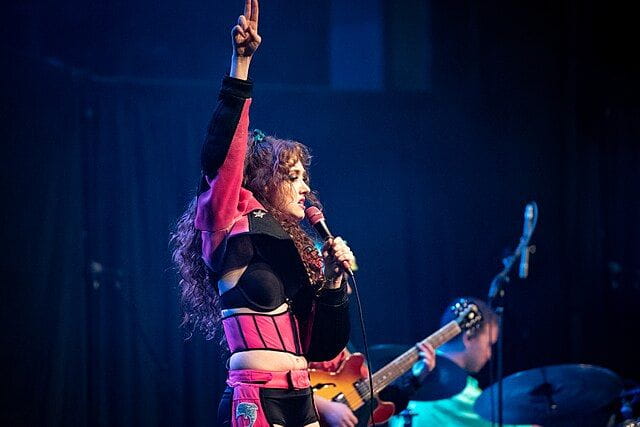Chappell Roan. From winning Best New Artist at the VMAs to topping the Billboard 200 Chart with her debut album “The Rise and Fall of a Midwestern Princess”, she is nothing short of a global pop phenomenon, or rather, a feminomenon!
However, that's not to say that she hasn't been surrounded by a cloud of controversy lately. 2024's breakout pop star has been receiving backlash surrounding her political views, bringing to the public's attention just how toxic fan culture can be. This all begs the question: should a celebrity's political views and identity really matter to the public, or is it just their art that matters?

Image Credit: Jason Martin from WikiMedia Commons
Let us slide into your dms 🥰
Get notified of top trending articles like this one every week! (we won't spam you)LGBTQIA+ Rights
Roan was first branded by the public as a politically controversial figure due to her lesbian sexuality. As a self-proclaimed “unapologetically queer woman”, the 26-year-old singer faced intense backlash for embracing this part of her identity in her music and concerts.
Image Credit: Alexander Grey from Unsplash
Throughout her world-famous “The Midwest Princess Tour”, Roan has repeatedly advocated for LGBTQIA+ rights. She celebrates this community, and her own identity, by embracing drag culture at her concerts. In fact, she even hires at least three local drag performers at each stop!
Since this came at a time when many conservative American states, such as Texas and Montana, were trying to ban drag, her actions seemed like acts of protest. In Roan's own home state of Tennessee, her Nashville concert featured drag performers the same day that state lawmakers passed a bill to ban drag performances. She opened up about these issues in an interview with ABC, focusing the lack of LGBTQIA+ awareness in the American Midwest.
“There are drag queens, there are people who are trans, there are massive queer communities that are just kind of hidden away in these teeny tiny towns. I feel like that's who my real community is, and I feel like that's what the community feels like at the shows.” ~ Chappell Roan
Then, there's the songs themselves. Some of Roan's biggest hits, such as “Good Luck, Babe!”, the single which went viral upon its release last year, and “The Giver”, a new (officially) unreleased country song, specifically follow LGBTQIA+ relationships. Many music lovers are unhappy with such lyrics and believe that she is excluding straight listeners.
However, as Roan herself has reiterated numerous times, anyone can enjoy her music! It is supposed to be fun, diverse, and inclusive, not make people feel uncomfortable.
Unfortunately, Roan is not the first celebrity to face unfair backlash due to celebrating their diverse identity. From Elton John in the 1970s to Lil Nas X in this past decade, artists coming out to society are typically met with discriminatory and abusive behaviour.
Their songs are held to a different standard as well: the reactions to suggestive lyrics from singers like Sabrina Carpenter and Ariana Grande are far more tame than those from LGBTQIA+ artists like Roan. Society is quick to cancel these celebrities for coming at things from a different perspective, and view them embracing their identity as pushing a political agenda, highlighting the intersection between politics and pop culture.

Take the Quiz: What’s Your Secret Superpower? This Quiz Will Reveal Which Singer Icon You Resemble
This fun quiz will unveil your unique qualities and reveal which music icon you resemble the most.
2024 Election
Roan's controversies grew even more political during last year's United States presidential election. Many of her fans were unpleased that she refused to endorse either candidate, instead saying in an interview with The Guardian “I don't feel pressured to endorse someone. There's problems on both sides. I encourage people to use [their] critical thinking skills, use your vote… vote small, vote for what's going on in your city.” Due to her trans rights advocacy, Roan's fans were shocked that she was not endorsing Kamala Harris, the more liberal candidate.

Image Credit: Lawrence Jackson from WikiMedia Commons
A few weeks later, Roan took to TikTok to clarify her comments, which had drawn a lot of criticism online, with people calling her “shallow” and “privileged”. She explained that even though she would not be voting for Donald Trump, she did not agree with certain Democratic policies and vowed to “always question those in power”. However, this was met with even more backlash, with critics saying that she simply used buzzwords to seem deep when, truly, she was an undecided voter.
Consequently, Roan posted a frustrated TikTok in which she not only confirmed that she would be voting for Harris, but also that she felt the Democratic party had “failed marginalised communities” in the past, leaving fans even more confused. Ultimately, a simple question turned into a large scandal, and people all across the internet were weighing in with their varying opinions.
Part of the reason why Roan's unwillingness to endorse a presidential candidate was such a big issue for fans was due to the precedent set by other celebrities. Since 1920, celebrities in the United States have been endorsing candidates prior to elections in an effort to use their influence to help their political stance.
From Babe Ruth supporting Al Smith in 1928 to Barbara Streisand's endorsement of Hillary Clinton in 2008, fans have grown to expect celebrities making their political views public. Given the particularly controversial nature of last year's election, the pressure on celebrities was heightened, with people like Taylor Swift, Harrison Ford, and Chloë Grace Moretz being criticised for endorsing candidates “too late” in the race.
White House Pride Celebration
Another reason why Roan is so politically controversial was her refusal to perform at a White House Pride event. At a music festival in New York last June, the singer revealed that she turned down an offer to sing at such an event, saying that “We want liberty, justice, and freedom for all. When you do that, that's when I'll come,” before dedicating her song My Kink is Karma to the White House, an obvious reference to her unhappiness with their handling of trans rights and the war in Gaza.
Roan said in an interview with Rolling Stone a few months later that she seriously considered attending the event. Her plan was to read out poetry by Palestinian women instead of singing to raise awareness and protest the government's support of Israel. Ultimately, she decided against it as she thought that the issues it would create would overpower the message itself. Regardless, her refusal to participate created enough controversy in and of itself, portraying her as a scandalous political figure.

Image Credit: Aaron Kittredge from Pexels
Roan is not the first, and will not be the last, celebrity to turn down invites from the White House. For example, following the Golden State Warriors' 2017 NBA Championship win, the entire team was invited by President Trump to the White House for a celebration. Famous player Steph Curry said at a press conference that he did not want to go due to opposing political views, causing basketball fans nationwide to weigh in with their opinions.
Another more similar example was just last year when Canadian poet Rupi Kaur was invited by Vice President Harris to attend the White House's Diwali celebration. She declined the invite and subsequently posted a letter saying, “I'm surprised this administration finds it acceptable to celebrate Diwali, when their support of the current atrocities against Palestinians represent the exact opposite of what this holiday means to many of us.” This is very similar to the reason why Roan declined her invite, and this instance was met with similar backlash from the public.
Conclusion
It is evident that Roan's political views did not exactly align with those of the Democratic Party, but many criticised her refusal to support the Democrats since they are more liberal and better suited to her values than those of the Republicans. However, if any other person who was not in the public eye held similar views, they would not be scrutinised and regarded in such a negative light.
Society is quick to judge public figures based on factors like their identity and political views rather than their art, which is what they should be famous for. Roan's frustration is warranted - she is a singer, after all, not a politician. Separating the art from the person is something that people should do more often. Not being a big fan of an artist due to their views is different from absolutely hating them and harshly criticising them online.

Image Credit: Jason Martin from WikiMedia Commons
If Roan had come out of her own accord to criticise politicians and say harmful statements, this story would have been completely different. Instead, she was pressured by fans to reveal her political views, and then was attacked because she did not hold the views many expected her to.
We often forget that celebrities are regular human beings just like you and I. Roan speaking out about how the backlash due to her politics has negatively impacted her mental health has been a stark, but important reminder of this fact. It is my hope that people bear this in mind the next time we cancel a celebrity for expressing views that we asked for, and that we learn to separate politics and pop culture.
These quick assumptions, judgements, and correlations are what lead to public outrage and toxic fan culture. As Chappell Roan herself said, “Please stop assuming things about me. There is always more to the story.”











.jpg)

